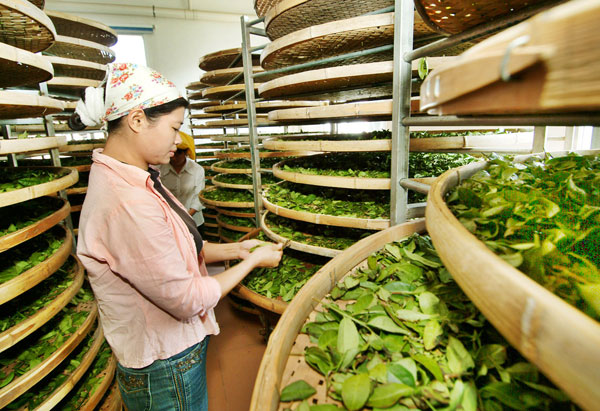
The first thing you notice when you enter Junying is the subtle fragrance of tea leaves that permeates the air.
Located in the steep, verdant mountains of Fujian province, the village has been producing tea for 300 years, and today its plantations cover 386 hectares.
 |
|
Workers process tea leaves at a workshop in Junying, a small village and home of tieguanyin (Iron Goddess of Mercy), a variety of oolong, a dark tea, in Xiamen, Fujian province. [Photo/China Daily] |
Yet, get any one of its residents on the subject of tea, and you will likely be met with a deep frown.
"The word 'tea' used to lift my spirits," said Gao Shuzu, who farms three-fifths of a hectare. "Now it just makes me more worried, as we've had a lot of setbacks in the past two years.
"The tea I harvested this spring made me only about 10,000 yuan ($1,600). I was making six times that four years ago."
Gao is among 500 residents in Junying - 80 percent of its population - who make a living growing and selling tea leaves.
Another is Hong Mugen, who until early this year had stored about 10 metric tons of tea wrapped in plastic bags in a warehouse in the vain hope that prices would go back up.
"Some of it was harvested in the spring of 2010," the year prices began to drop dramatically, the 42-year-old said.
Hong said that eventually, he faced up to reality and decided to sell what he had in storage along with the leaves picked this spring from his 2-hectare plantation.
The lowest price he got was 10 yuan a kilogram, and in the end he made less than 30,000 yuan net profit.
"The situation has dampened the mood of villagers," he said. "Many stopped planting tea and became migrant workers in cities."
Sunshine and water
Junying, about 66 km from downtown Xiamen, is more than 800 meters above sea level and is the home of tieguanyin (Iron Goddess of Mercy), a variety of oolong, a dark tea.
"We have plenty of sunshine and water, but no industrial pollution," said Gao Quanyang, the village head. "The difference in temperature between day and night in the mountains is huge, meaning tea trees are less vulnerable to disease and pests. It makes the village a nice place to plant fine quality tea."
Despite the low prices of the past two years, he said the village still produces more than 300 tons of tea annually.
Wang Guiqing, general manager of Fujian Tea Import and Export, said the tea price issue is partially due to European countries' raising the testing standards on imports from China.
China is the world's third-largest tea exporter, with its products sold to more than 120 nations and regions.
Tea exports absolutely contribute to the profits for growers in Junying, Wang said.
In 2011, the European Commission issued an order calling for stricter testing on Chinese tea exports to the European Union, stipulating that 10 percent of the goods should undergo onsite inspections for pesticide residue.
Given the restrictions, the right thing to do is deal with tea in the domestic market, village head Gao Quanyang said. However, he said, despite the high quality of Junying tea, the village's products do not sell well in China, reflecting a lack of brand image.
"Of course, we won't be sitting ducks. Changes have been made to tackle the crisis," he said.
The first such change has been developing the production of organic tea.
The village has contacted Xiamen's major tea companies, which will help coach grassroots growers about quality-control measures, including the use of pesticides and final processing.
"Safety and quality are everything," Gao Quanyang said. "They are the fundamental elements of strengthening the brand, wining customers and meeting the testing standard set by other parties."
 Domestic auto lineup looks overseas
Domestic auto lineup looks overseas Electric car industry in the slow lane
Electric car industry in the slow lane Brighter days for solar power
Brighter days for solar power Market flat, Japan-brand sales plummet
Market flat, Japan-brand sales plummet